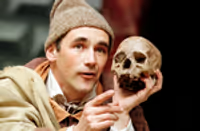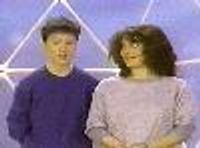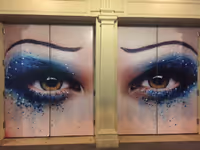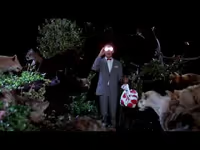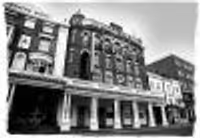GREY HOUSE Previews
#25GREY HOUSE Previews
Posted: 4/29/23 at 10:21pm
Ok, just got out of the show.
Still collection my thoughts, but initial reaction is that the production is excellently crafted, and the script is pretty fascinating.
I’m not spoiling anything here, but if you really want to know *nothing at all* about the general vibe/experience, read at your own discretion.
Some parts are definitely eerie and/or unnerving, but it’s not a play that I’d describe as a big “scare-fest.” It can be very funny at times too, and sometimes even hauntingly beautiful. Definitely some creeps and chills, but don’t expect a lot of jump scares.
It’s also not a play that provides easy answers to its mysteries. I think I got the general idea at the end, but I definitely need time to process what exactly happened, and what the playwright was trying say with it. But I mean that in a good way; I’m going to be thinking a lot about it, and I’ll be very curious to read other people’s interpretations. But I could also see some people being turned off by it, and walking out more confused than thrilled.
The cast is great. This is probably Metcalf’s least showy stage role in recent years, but she’s obviously still great. The 4 young women in the play all work together so seamlessly; there’s a lot of finely-coordinated stage business between them, and they nailed it. Really feels like an ensemble piece, although I guess Tatiana Maslany’s role could be called the protagonist.
I’d say the production is already is great shape.
I was in the 2nd seat off the aisle, Mezzanine house left. There were definitely some moments upstage right that I missed, but mostly I felt like I saw everything important. The seat next to mine was considerably worse though, because of the curve of the row. The guy sitting next to me ended up standing at the back of the mezzanine for the whole show, and the person behind him complained at the end that she missed 90% of the play. So I guess the lesson is to avoid the far aisle seats if possible. But even 1 seat over made a big difference - I wasn’t upset with my view for $35, even with some noticeable restriction.
#26GREY HOUSE Previews
Posted: 4/29/23 at 10:42pm
JoeW4 said: "Ok, just got out of the show.
Still collection my thoughts, but initial reaction is that the production is excellently crafted, and the script is pretty fascinating.
I’m not spoiling anything here, but if you really want to know *nothing at all* about the general vibe/experience, read at your own discretion.
Some parts are definitely eerie and/or unnerving, but it’s not a play that I’d describe as a big “scare-fest.” It can be very funny at times too, and sometimes even hauntingly beautiful. Definitely some creeps and chills, but don’t expect a lot of jump scares.
It’s also not a play that provides easy answers to its mysteries. I think I got the general idea at the end, but I definitely need time to process what exactly happened, and what the playwright was trying say with it. But I mean that in a good way; I’m going to be thinking a lot about it, and I’ll be very curious to read other people’s interpretations.
The cast is great. This is probably Metcalf’s least showy stage role in recent years, but she’s obviously still great. The 4 young women in the play all work together so seamlessly; there’s a lot of finely-coordinated stage business between them, and they nailed it. Really feels like an ensemble piece, although I guess Tatiana Maslany’s role could be called the protagonist.
I’d say the production is already is great shape.
I was in the 2nd seat off the aisle, Mezzanine house left. There were definitely some moments upstage right that I missed, but mostly I felt like I saw everything important. The seat next to mine was considerably worse though, because of the curve of the row. The guy sitting next to me ended up standing at the back of the mezzanine for the whole show, and the person behind him complained at the end that she missed 90% of the play. So I guess the lesson is to avoid the far aisle seats if possible. But even 1 seat over made a big difference - I wasn’t upset with my view for $35, even with some noticeable restriction."
Thanks for the detailed review- what’s the running time?
#27GREY HOUSE Previews
Posted: 4/29/23 at 10:44pm
The show’s website lists a 100-minute runtime and no intermission, but as per usual, I’d assume it took a bit longer tonight for first preview.
#28GREY HOUSE Previews
Posted: 4/29/23 at 10:45pm
^For an 8:00 curtain, it got out around 9:50 I think? Maybe a few minutes before? It flew by for me.
Voter
Broadway Star Joined: 5/19/20
#29GREY HOUSE Previews
Posted: 4/29/23 at 11:00pm
JoeW4 said: "Ok, just got out of the show.
Still collection my thoughts, but initial reaction is that the production is excellently crafted, and the script is pretty fascinating.
I’m not spoiling anything here, but if you really want to know *nothing at all* about the general vibe/experience, read at your own discretion.
Some parts are definitely eerie and/or unnerving, but it’s not a play that I’d describe as a big “scare-fest.” It can be very funny at times too, and sometimes even hauntingly beautiful. Definitely some creeps and chills, but don’t expect a lot of jump scares.
It’s also not a play that provides easy answers to its mysteries. I think I got the general idea at the end, but I definitely need time to process what exactly happened, and what the playwright was trying say with it. But I mean that in a good way; I’m going to be thinking a lot about it, and I’ll be very curious to read other people’s interpretations. But I could also see some people being turned off by it, and walking out more confused than thrilled.
The cast is great. This is probably Metcalf’s least showy stage role in recent years, but she’s obviously still great. The 4 young women in the play all work together so seamlessly; there’s a lot of finely-coordinated stage business between them, and they nailed it. Really feels like an ensemble piece, although I guess Tatiana Maslany’s role could be called the protagonist.
I’d say the production is already is great shape.
I was in the 2nd seat off the aisle, Mezzanine house left. There were definitely some moments upstage right that I missed, but mostly I felt like I saw everything important. The seat next to mine was considerably worse though, because of the curve of the row. The guy sitting next to me ended up standing at the back of the mezzanine for the whole show, and the person behind him complained at the end that she missed 90% of the play. So I guess the lesson is to avoid the far aisle seats if possible. But even 1 seat over made a big difference - I wasn’t upset with my view for $35, even with some noticeable restriction."
is the play very bloody? Or gruesome?
#30GREY HOUSE Previews
Posted: 4/29/23 at 11:11pm
Voter said: "is the play very bloody? Or gruesome?"
It has its moments, yes. I'll try to be vague about the circumstances, but some inherent spoilers below:
The worst is a moment where they use a prosthetic to depict the skin on someone's leg getting peeled upward, and some sort of vein/muscle chord or something getting pulled out of it. It was well-done for a stage effect, but not quite realistic enough to make me squirm (and I can be sensitive to these things).
A character also has a broken leg, on which we see a lot of bruising and some blood on the clothes and head, but not too graphic. The leg then gets beat around to some extent, so the character is in a lot of pain, which can be a bit cringe.
There's also a moment where some blood pours out of an actor's mouth.
We also see a dead bird getting dissected.
There's a scene where we hear a character offstage getting some minor injuries by impact.
A character vomits at one point as well
^I guess it sounds like a lot when I type it out like that, but in the moment, it doesn't FEEL like the play is hitting you over the head with a lot of gruesome stuff.
hcamille
Swing Joined: 3/12/16
#31GREY HOUSE Previews
Posted: 4/29/23 at 11:20pm
JoeW4 said: "Ok, just got out of the show.
Still collection my thoughts, but initial reaction is that the production is excellently crafted, and the script is pretty fascinating.
I’m not spoiling anything here, but if you really want to know *nothing at all* about the general vibe/experience, read at your own discretion.
Some parts are definitely eerie and/or unnerving, but it’s not a play that I’d describe as a big “scare-fest.” It can be very funny at times too, and sometimes even hauntingly beautiful. Definitely some creeps and chills, but don’t expect a lot of jump scares.
It’s also not a play that provides easy answers to its mysteries. I think I got the general idea at the end, but I definitely need time to process what exactly happened, and what the playwright was trying say with it. But I mean that in a good way; I’m going to be thinking a lot about it, and I’ll be very curious to read other people’s interpretations. But I could also see some people being turned off by it, and walking out more confused than thrilled.
The cast is great. This is probably Metcalf’s least showy stage role in recent years, but she’s obviously still great. The 4 young women in the play all work together so seamlessly; there’s a lot of finely-coordinated stage business between them, and they nailed it. Really feels like an ensemble piece, although I guess Tatiana Maslany’s role could be called the protagonist.
I’d say the production is already is great shape.
I was in the 2nd seat off the aisle, Mezzanine house left. There were definitely some moments upstage right that I missed, but mostly I felt like I saw everything important. The seat next to mine was considerably worse though, because of the curve of the row. The guy sitting next to me ended up standing at the back of the mezzanine for the whole show, and the person behind him complained at the end that she missed 90% of the play. So I guess the lesson is to avoid the far aisle seats if possible. But even 1 seat over made a big difference - I wasn’t upset with my view for $35, even with some noticeable restriction."
Adding to this – I was orchestra right, N18 (second to last row, on the far aisle). There was one thing toward the beginning that I know I missed based on the audience reaction, but otherwise it was a totally fine view! With the way the stage is set up and based on where the bulk of the action is, Idk that I’d sit on the far aisle orch left.
#32GREY HOUSE Previews
Posted: 4/29/23 at 11:22pm
Was there any merchandise on sale?
#33GREY HOUSE Previews
Posted: 4/30/23 at 12:21am
uncageg said: "Was there any merchandise on sale?"
The usuals: Shirt, magnet, hoodie, window card, pin, keychain, tote bag.
They had a step and repeat downstairs for photos and a photographer taking photos on another background that you get digitally.
#34GREY HOUSE Previews
Posted: 4/30/23 at 1:00am
Attended tonight’s performance of Grey House. My expectations were very high. I love thrillers and horror and it has a great cast lead by Laurie Metcalf. How could it go wrong? When we got to our seats there were invitations on every seat. When opened it revealed a letter basically asking to please keep secret as to what is going on here and what is being done here accompanied by a thin red bracelet. I couldn’t have been more excited. However, by the end Grey House didn’t have to worry what I might tell anyone about what happened here tonight because I had no idea what happened. 🤷♂️
The production looks terrific and the cast is top notch. It really is an ensemble piece, with what felt like the slightly larger roles tipping towards Sophia Ann Caruso and Paul Sparks. Laurie Metcalf is good as always but honestly she felt completely wasted here. I left wondering why she agreed to do it.
There are a few jump scares early on and some gore towards the end but nothing too horrible. The whole thing has a creepy vibe to it but never really kicks in. Once scenes start heading in that direction they end and don’t get explained. In particular the scene where the girls and Tatiana Maslany play a game.
There’s a lot of head scratching going on and having faith that by the end it will all make sense or get close at least. After the final big dinner scene where all seems to come to light, you’re left with more questions than answers. Perhaps that’s the point, but I personally didn’t go into a thriller expecting pretentiousness but that’s a lot of what it came off as, with an ending scene that was just as perplexing as the dinner scene before it.
The play ended and my husband and I both looked at each other like “what was that?” And there were many people around us who were saying the same thing, however there were others as we exited praising it, so what do I know?
I’m glad I saw it, but ultimately was disappointed however others may enjoy the loose ends and no explanations. It certainly created a discussion after the show on the ride home.
As a fun side note, Joe Mantello sat across the aisle from us with clearly other creatives from the show, and the author a few rows down. He was pretty quiet until the last 20 minutes or so where you could hear him taking down a lot of notes as the finale played out.
#35GREY HOUSE Previews
Posted: 4/30/23 at 2:45am
Rypm25 said: "Attended tonight’s performance of Grey House. My expectations were very high. I love thrillers and horror and it has a great cast lead by Laurie Metcalf. How could it go wrong? When we got to our seats there were invitations on every seat. When opened it revealed a letter basically asking to please keep secret as to what is going on here and what is being done here accompanied by a thin red bracelet. I couldn’t have been more excited. However, by the end Grey House didn’t have to worry what I might tell anyone about what happened here tonight because I had no idea what happened. ?♂️"
I finally understood what that red bracelet meant by the end of the play ![]()
After the end of the play, the person next to me asked his boyfriend "What the heck did we just see?" and he replied back "I don't know but you bought the tickets!" Lots of processing. I also wish Laurie Metcalf had a bigger role.
#36GREY HOUSE Previews
Posted: 4/30/23 at 8:54am
Any discount codes mailed?
Pipe smoking offensive from smell perspective?
JasonC3
Broadway Legend Joined: 4/22/21
#37GREY HOUSE Previews
Posted: 4/30/23 at 9:19am
Discounts code from BroadwayBox is GHBBOX and the Broadway Discounts thread also has GHBWORLD posted.
Updated On: 4/30/23 at 09:19 AM
jbird5
Broadway Star Joined: 12/20/15
#39GREY HOUSE Previews
Posted: 4/30/23 at 9:48am
WldKingdomHM said: "So how long is Laurie on stage for ?"
She’s in and out. Even when she’s on stage, she’s not necessarily a focus of the action. It’s an ensemble piece. I’d say Tatiana is the female lead. Even Sophia has a smaller role than expected.
Colby Kipness stood out as “Squirrel”. She outcreeps SAC which is quite an accomplishment.
#40GREY HOUSE Previews
Posted: 4/30/23 at 9:56am
I got my seats on TDF, but they came down rather quickly; haven't seen it up there since.
JasonC3
Broadway Legend Joined: 4/22/21
#41GREY HOUSE Previews
Posted: 4/30/23 at 10:00am
The lack of Metcalf stage time has diminished some of my interest in seeing this. I hope we get to see her on stage again soon in a substantial leading role that plays to her strengths.
hcamille
Swing Joined: 3/12/16
#42GREY HOUSE Previews
Posted: 4/30/23 at 10:03am
Rypm25 said:
There’s a lot of head scratching going on and having faith that by the end it will all make sense or get close at least. After the final big dinner scene where all seems to come to light, you’re left with more questions than answers. Perhaps that’s the point, but I personally didn’t go into a thriller expecting pretentiousness but that’s a lot of what it came off as, with an ending scene that was just as perplexing as the dinner scene before it.
The play ended and my husband and I both looked at each other like “what was that?” And there were many people around us who were saying the same thing, however there were others as we exited praising it, so what do I know?
I’m glad I saw it, but ultimately was disappointed however others may enjoy the loose ends and no explanations. It certainly created a discussion after the show on the ride home.
MAJOR plot spoilers below. Don’t read if you don’t want to be completely spoiled.
The rest I think I’ve figured out, but I’m still so confused about Henry. My impression is that the only thing he actually did was “hurt” (kill?) his lab partner when he was a kid. And Max knew about that because she immediately jumps to his defense and says “you were just a kid” or something. But the rest (Nazi officer, stabbing the deaf girl, etc.) were either his past lives OR drinking the “moonshine” had him embodying the men who had killed/abused the girls. There’s also an implication that he’s an alcoholic (Max saying something about him not being allowed to drive, there’s some hesitation from both of them when he’s first offered the moonshine with Max saying he’s allowed if he “needs it.”
I’m also not 100% clear on how the older woman in the white dress fits in. I think she’s the mother who walked into the ocean to drown herself and her daughter, and Squirrel is the lab partner he killed (which is also why when the power goes out she’s in a black dress when the lights come up, symbolizing it’s her turn to get revenge/move on to the afterlife).
Was chatting through that after the show with my seat neighbor and she said killing a girl as a juvenile/little kid wasn’t nearly as bad as the rest of the crimes listed so she found it a bit anticlimactic. But I think the point was that it still haunted him as he went on to live a “normal” life.
The show definitely could have been more explicit about Henry’s whole deal (again, assuming I’m right lol). But the rest of it (the girls are ghosts and the men who hurt them are eventually led to the house to die, allowing each girl to move on and another to move in) seemed mostly clear by the end. Still not sure about the boy, Mr. Man.
EAPEAPMO
Understudy Joined: 3/25/23
#43GREY HOUSE Previews
Posted: 4/30/23 at 1:42pm
JasonC3 said: "The lack of Metcalf stage time has diminished some of my interest in seeing this. I hope we get to see her on stage again soon in a substantial leading role that plays to her strengths."
I saw the first preview last night and it definitely played to her strengths, she was a thrill any time she was on stage. Overall, the show was excellent especially for a first run. I was a little bit confused at times, but the amount of layers this show has I think lends to that so I was unable to unpack a lot of things I'd missed in discussions with people after the show. I'm going to go see it a second time in a few weeks to see if there are any changes + to go in with a better understanding of the material to see what I missed the first time around.
#44GREY HOUSE Previews
Posted: 4/30/23 at 1:55pm
Ok, last night I racked my brain to parse out the mysteries while it was still fresh in my mind. And I think I’ve come up with a mostly satisfying interpretation. See below *100% SPOILERS*
Firstly, the basic premise:
The house is a kind of purgatory that isn’t exactly bound by time. The children who live there were all killed and abused by men in tragic circumstances. There’s an element of pre-destiny, whereby the house draws in the men who have harmed these young girls, so the children can enact vengeance on them. In the process, they extract fluid from each man and collect them as the “nectar of dead men,” as well as taking their veins/muscle chords (whatever those red strings are, I’m no biologist lol), and tie them into a tapestry. And Henry is next in that line of men who need to be punished.
What did Henry do?
Like @hcamille said above, my biggest source of confusion is around Henry, and what he did. It’s clear that the multiple stories he tells in the dinner scene correspond with the other girls: Marlow was the one killed raped by her father and killed by her mother, Bernie was obviously the deaf girl who was attacked, “A1656” was the girl in the concentration camp, and Squirrel was the one who was chased through the forest in the 1800s. Henry’s crime was hurting his lab partner, I guess.
But why does he say he did ALL those things, and who is the lab partner that he hurt? At first I thought it was Squirrel, because of the way she “takes the lead” on guiding Henry through his guilty past. But that doesn’t make sense with the years given - I’m pretty sure they said Squirrel was chased through the forest in the 1800s.
But I think @hcamille’s theory makes sense, that the multiple stories he tells maybe came from having drunk those men’s “nectar.” But whatever the literal explanation (or lack thereof) I do think it’s supposed to be symbolic of men throughout history abusing young women, and how all these men are reflections of each other; they’re all the same, underneath.
What causes the girls to arrive at / leave the house?
At first, when I thought that Squirrel was Henry’s lab partner, I figured that when each girl’s respective abuser is killed, she gets to move on. But that doesn’t make sense if Squirrel isn’t the lab partner. Plus, it also doesn’t make sense if Hank drank the nectar of the other girls’ abusers, because then they would’ve had to have been through the house already - and the other girls still haven’t moved on.
That, combined with the fact that Hank’s lab partner isn’t present in the house, made me lean toward this theory:
Could it be that the girl at the end is Hank’s lab partner? If the house is a safe haven for the girls, maybe her spirit couldn’t arrive UNTIL her abuser had been taken out.
The old lady:
I think it’s heavily implied that the old lady is Squirrel all grown up. She’s always wearing the same thing as Squirrel, and she moves similarly (when we first see her, she climbs out of the wall, and we know that Squirrel likes to get inside the walls too). Metcalf has a line about how ghosts are the reflections of our future selves, and because the house exists in a blurred state of time, the “future shadow” of what Squirrel would’ve become begins to appear, and she too gets to move onto the afterlife in the end, at the same time that young Squirrel does.
But if Squirrel isn’t the lab partner, why is she the one that gets to move on?
I don’t think this is explained, but I think we’re meant to assume that there’s a natural ebb and flow to the way the girls come in and out. They knew that with a new man arriving, a new girl would be coming. So Squirrel maybe knew, somehow, that it was her time. She was ready to leave, so she “took the lead” on Henry’s downfall, and maybe that’s what allowed her to move on?
The Boy (Mr. Man)
This one might be leap, but I think (??) it’s pretty heavily implied that the boy in the house is Henry’s younger self? Again, the house exists in a blurred state of time. And in the bedtime story scene, the play draws clear parallels between Henry and the Boy/Mr. Man. He remembers the bedtime story, presumably from when he was that age, and it haunts him. And afterward, they play a sort of “peek-a-boo” where their movements mirror each other. Also, Marlow (Caruso) says that the Boy has had many different names, which could be interpreted as the Boy always being the younger self of whichever man is currently in the house.
Max and Raleigh
Because Max (Maslany) came with Hank, and because she gets along with the kids so well, she’s essentially getting prepped to replace Raleigh (Metcalf) as the new mother of the house. And it’s implied that this was pre-destined, in some way.
Max arrives, and realizes she has a connection with the kids. She grows to love them and empathize with their tragic circumstances, and so decides to take over Raleigh’s role as Raleigh takes her leave. Max wants to leave too, at first but when she sees the “new girl” enter at the end, she has a change a heart. Upon seeing how vulnerable she is, she decides to stay to help. Though she’s been frightened by the house, and the girls, she realizes what they’re there, and decides to stay.
It’s also suggested that both Raleigh and Max had troubled childhoods, which perhaps contributed to them lacking a sense of purpose in the outside world. But unlike the young girls, they’re the ones that “made it” to adulthood, even if they couldn’t shake their trauma entirely. So they arrive at the house in a similar way as each other, and take the leadership role with the girls.
Between that, and my earlier theory about the girls sort of “clearing the way” for new girls to come, there seems to be a theme of “paying it forward,” in a way. Of these women and girls channeling their own trauma to help “resolve” the trauma of others (albeit in a gruesome way, but that’s the horror genre for you).
I have to say, parsing all of this out has given me a much deeper appreciation for the play. I still don’t think it’s perfect, but I’ve already found it to be very rewarding, even just since last night.
I usually don’t get around to seeing things more than once, but I think this one would really benefit repeat viewings.
Also, it occurred to me that this would make a very good A24-style horror film!
#45GREY HOUSE Previews
Posted: 4/30/23 at 2:59pm
So I gave my initial thoughts on this when I got home last night but now I’ve had time to sit with it, and i find myself more ticked off this afternoon more so than I was last night. Just some random thoughts, starting with the advertising of this show. Pretty much all of the advertising points at and suggests to the audience this is a horror/thriller. One in particular features the sounds of heavy breathing while referencing The Shining, Psycho, Jaws and Friday the 13th. This play has a creepy vibe with 2 early jump scares. To reference these properties and suggest Grey House belongs in the same category is absolutely ridiculous and that’s a problem for an audience member purchasing a ticket for something promised that’s never been intended to be delivered.
Further thoughts on Laurie Metcalf, my opinion hasn’t changed. Again she’s doing a fine job, but she’s given nothing to do. She’s present, she’s there but she’s given nothing to do. Her character could be gone from the play and it wouldn’t change anything in what happens. She’s comes and goes with either a sarcastic punch line, swearing at one of the kids or visibly depressed or upset. In the final scene it seemed like this would be her moment, but no. She has a final scene with not much weight or meat to it.
Without going into spoilers, there’s quite a few stops and starts with horror or thriller moments that fizzle out and go nowhere. The truth and lies game, the ancient one, the knocks on the walls, the basement…what is going on in that basement? Sounds a lot more interesting than what’s happening on the main stage.
There is so much talent on the stage and behind it here and it’s just so disappointing to me that this is what they are delivering, but again others seem to be really digging it, so if you’re going into it for what I was which was a horror/thriller, you most likely will be disappointed.
EAPEAPMO
Understudy Joined: 3/25/23
#46GREY HOUSE Previews
Posted: 4/30/23 at 3:28pm
JoeW4 said: "Ok, last night I racked my brain to parse out the mysteries while it was still fresh in my mind. And I think I’ve come up with a mostly satisfying interpretation. See below *100% SPOILERS*
The house is a kind of purgatory that isn’t exactly bound by time. The children who live there were all killed and abused by men in tragic circumstances. There’s an element of pre-destiny, whereby the house draws in the men who have harmed these young girls, so the children can enact vengeance on them. In the process, they extract fluid from each man and collect them as the “nectar of dead men,” as well as taking their veins/muscle chords (whatever those red strings are, I’m no biologist lol), and tie them into a tapestry. And Henry is next in that line of men who need to be punished.
What did Henry do?
Like @hcamille said above, my biggest source of confusion is around Henry, and what he did. It’s clear that the multiple stories he tells in the dinner scene correspond with the other girls: Marlow was the one killed raped by her father and killed by her mother, Bernie was obviously the deaf girl who was attacked, “A1656” was the girl in the concentration camp, and Squirrel was the one who was chased through the forest in the 1800s. Henry’s crime was hurting his lab partner, I guess.
But why does he say he did ALL those things, and who is the lab partner that he hurt? At first I thought it was Squirrel, because of the way she “takes the lead” on guiding Henry through his guilty past. But that doesn’t make sense with the years given - I’m pretty sure they said Squirrel was chased through the forest in the 1800s.
But I think @hcamille’s theory makes sense, that the multiple stories he tells maybe came from having drunk those men’s “nectar.” But whatever the literal explanation (or lack thereof) I do think it’s supposed to be symbolic of men throughout history abusing young women, and how all these men are reflections of each other; they’re all the same, underneath.
What causes the girls to arrive at / leave the house?
At first, when I thought that Squirrel was Henry’s lab partner, I figured that when each girl’s respective abuser is killed, she gets to move on. But that doesn’t make sense if Squirrel isn’t the lab partner. Plus, it also doesn’t make sense if Hank drank the nectar of the other girls’ abusers, because then they would’ve had to have been through the house already - and the other girls still haven’t moved on.
That, combined with the fact that Hank’s lab partner isn’t present in the house, made me lean toward this theory:
Could it be that the girl at the end is Hank’s lab partner?If the house is a safe haven for the girls, maybe her spirit couldn’t arrive UNTIL her abuser had been taken out.
The old lady:
I think it’s heavily implied that the old lady is Squirrel all grown up. She’s always wearing the same thing as Squirrel, and she moves similarly (when we first see her, she climbs out of the wall, and we know that Squirrel likes to get inside the walls too). Metcalf has a line about how ghosts are the reflections of our future selves, and because the house exists in a blurred state of time, the “future shadow” of what Squirrel would’ve become begins to appear, and she too gets to move onto the afterlife in the end, at the same time that young Squirrel does.
But if Squirrel isn’t the lab partner, why is she the one that gets to move on?
I don’t think this is explained, but I think we’re meant to assume that there’s a natural ebb and flow to the way the girls come in and out. They knew that with a new man arriving, a new girl would be coming. So Squirrel maybe knew, somehow, that it was her time. She was ready to leave, so she “took the lead” on Henry’s downfall, and maybe that’s what allowed her to move on?
The Boy (Mr. Man)
This one might be leap, but I think (??) it’s pretty heavily implied that the boy in the house is Henry’s younger self? Again, the house exists in a blurred state of time. And in the bedtime story scene, the play draws clear parallels between Henry and the Boy/Mr. Man. He remembers the bedtime story, presumably from when he was that age, and it haunts him. And afterward, they play a sort of “peek-a-boo” where their movements mirror each other. Also, Marlow (Caruso) says that the Boy has had many different names, which could be interpreted as the Boy always being the younger self of whichever man is currently in the house.
Max and Raleigh
Because Max (Maslany) came with Hank, and because she gets along with the kids so well, she’s essentially getting prepped to replace Raleigh (Metcalf) as the new mother of the house. And it’s implied that this was pre-destined, in some way.
Max arrives, and realizes she has a connection with the kids. She grows to love them and empathize with their tragic circumstances, and so decides to take over Raleigh’s role as Raleigh takes her leave. Max wants to leave too, at first but when she sees the “new girl” enter at the end, she has a change a heart. Upon seeing how vulnerable she is, she decides to stay to help. Though she’s been frightened by the house, and the girls, she realizes what they’re there, and decides to stay.
It’s also suggested that both Raleigh and Max had troubled childhoods, which perhaps contributed to them lacking a sense of purpose in the outside world. But unlike the young girls, they’re the ones that “made it” to adulthood, even if they couldn’t shake their trauma entirely. So they arrive at the house in a similar way as each other, and take the leadership role with the girls.
Between that, and my earlier theory about the girls sort of “clearing the way” for new girls to come, there seems to be a theme of “paying it forward,” in a way. Of these women and girls channeling their own trauma to help “resolve” the trauma of others (albeit in a gruesome way, but that’s the horror genre for you).
I have to say, parsing all of this out has given me a much deeper appreciation for the play. I still don’t think it’s perfect, but I’ve already found it to be very rewarding, even just since last night.
I usually don’t get around to seeing things more than once, but I think this one would really benefit repeat viewings.
Also, it occurred to me that this would make a very good A24-style horror film!"
This is such thorough and awesome analysis, really impressive! I 100% agree it would make for an excellent film - I imagine on film it'd be easier to gear up some of the horror elements of the house/girls, I wonder how far they might be able to take it on stage vs the first preview, clearly had a few kinks to work out w/ (spoilers, but you probably know which one) but I have to imagine they know that and will get it there... it'll be cool to see it a second time and apply your analysis b/c it blows mine out of the water, plus see whatever changes get made over the next few weeks.
hcamille
Swing Joined: 3/12/16
#47GREY HOUSE Previews
Posted: 4/30/23 at 3:53pm
JoeW4 said: "Ok, last night I racked my brain to parse out the mysteries while it was still fresh in my mind. And I think I’ve come up with a mostly satisfying interpretation. See below *100% SPOILERS*
The house is a kind of purgatory that isn’t exactly bound by time. The children who live there were all killed and abused by men in tragic circumstances. There’s an element of pre-destiny, whereby the house draws in the men who have harmed these young girls, so the children can enact vengeance on them. In the process, they extract fluid from each man and collect them as the “nectar of dead men,” as well as taking their veins/muscle chords (whatever those red strings are, I’m no biologist lol), and tie them into a tapestry. And Henry is next in that line of men who need to be punished.
What did Henry do?
Like @hcamille said above, my biggest source of confusion is around Henry, and what he did. It’s clear that the multiple stories he tells in the dinner scene correspond with the other girls: Marlow was the one killed raped by her father and killed by her mother, Bernie was obviously the deaf girl who was attacked, “A1656” was the girl in the concentration camp, and Squirrel was the one who was chased through the forest in the 1800s. Henry’s crime was hurting his lab partner, I guess.
But why does he say he did ALL those things, and who is the lab partner that he hurt? At first I thought it was Squirrel, because of the way she “takes the lead” on guiding Henry through his guilty past. But that doesn’t make sense with the years given - I’m pretty sure they said Squirrel was chased through the forest in the 1800s.
But I think @hcamille’s theory makes sense, that the multiple stories he tells maybe came from having drunk those men’s “nectar.” But whatever the literal explanation (or lack thereof) I do think it’s supposed to be symbolic of men throughout history abusing young women, and how all these men are reflections of each other; they’re all the same, underneath.
What causes the girls to arrive at / leave the house?
At first, when I thought that Squirrel was Henry’s lab partner, I figured that when each girl’s respective abuser is killed, she gets to move on. But that doesn’t make sense if Squirrel isn’t the lab partner. Plus, it also doesn’t make sense if Hank drank the nectar of the other girls’ abusers, because then they would’ve had to have been through the house already - and the other girls still haven’t moved on.
That, combined with the fact that Hank’s lab partner isn’t present in the house, made me lean toward this theory:
Could it be that the girl at the end is Hank’s lab partner?If the house is a safe haven for the girls, maybe her spirit couldn’t arrive UNTIL her abuser had been taken out.
The old lady:
I think it’s heavily implied that the old lady is Squirrel all grown up. She’s always wearing the same thing as Squirrel, and she moves similarly (when we first see her, she climbs out of the wall, and we know that Squirrel likes to get inside the walls too). Metcalf has a line about how ghosts are the reflections of our future selves, and because the house exists in a blurred state of time, the “future shadow” of what Squirrel would’ve become begins to appear, and she too gets to move onto the afterlife in the end, at the same time that young Squirrel does.
But if Squirrel isn’t the lab partner, why is she the one that gets to move on?
I don’t think this is explained, but I think we’re meant to assume that there’s a natural ebb and flow to the way the girls come in and out. They knew that with a new man arriving, a new girl would be coming. So Squirrel maybe knew, somehow, that it was her time. She was ready to leave, so she “took the lead” on Henry’s downfall, and maybe that’s what allowed her to move on?
The Boy (Mr. Man)
This one might be leap, but I think (??) it’s pretty heavily implied that the boy in the house is Henry’s younger self? Again, the house exists in a blurred state of time. And in the bedtime story scene, the play draws clear parallels between Henry and the Boy/Mr. Man. He remembers the bedtime story, presumably from when he was that age, and it haunts him. And afterward, they play a sort of “peek-a-boo” where their movements mirror each other. Also, Marlow (Caruso) says that the Boy has had many different names, which could be interpreted as the Boy always being the younger self of whichever man is currently in the house.
Max and Raleigh
Because Max (Maslany) came with Hank, and because she gets along with the kids so well, she’s essentially getting prepped to replace Raleigh (Metcalf) as the new mother of the house. And it’s implied that this was pre-destined, in some way.
Max arrives, and realizes she has a connection with the kids. She grows to love them and empathize with their tragic circumstances, and so decides to take over Raleigh’s role as Raleigh takes her leave. Max wants to leave too, at first but when she sees the “new girl” enter at the end, she has a change a heart. Upon seeing how vulnerable she is, she decides to stay to help. Though she’s been frightened by the house, and the girls, she realizes what they’re there, and decides to stay.
It’s also suggested that both Raleigh and Max had troubled childhoods, which perhaps contributed to them lacking a sense of purpose in the outside world. But unlike the young girls, they’re the ones that “made it” to adulthood, even if they couldn’t shake their trauma entirely. So they arrive at the house in a similar way as each other, and take the leadership role with the girls.
Between that, and my earlier theory about the girls sort of “clearing the way” for new girls to come, there seems to be a theme of “paying it forward,” in a way. Of these women and girls channeling their own trauma to help “resolve” the trauma of others (albeit in a gruesome way, but that’s the horror genre for you).
I have to say, parsing all of this out has given me a much deeper appreciation for the play. I still don’t think it’s perfect, but I’ve already found it to be very rewarding, even just since last night.
I usually don’t get around to seeing things more than once, but I think this one would really benefit repeat viewings.
Also, it occurred to me that this would make a very good A24-style horror film!"
great analysis!
Good catch re: Squirrel was the girl in the woods. I think I missed that and combined it with the deaf girl (Bernie) who was stabbed. I also thought that maybe the older woman was S’s spirit as an adult, but just realized she’s named “The Ancient” in the playbill. Which now has me thinking she’s a “founder” of sorts and is a constant in the cabin. And maybe she does take on the spirit of the girls as adults.
And now I’m trying to piece together what the restaurant “dream” scene with The Ancient might have meant. Maybe a reflection of how she herself was killed while out on a date? Or some kind of representation of experiences Squirrel missed out on? I wonder why Squirrel was used to represent the lab partner. I think the girl at the end seemed to young to be the lab partner, but then again Henry was depicted as pretty young in the “dream” sequence and the girl seemed to be around the age of Mr. Man (and I think you’re spot on about him representing the younger version of the men/Henry).
I’m also now wondering what Raleigh’s dad did to bring him to the house. We know her mother committed suicide, but I forget – did we learn anything about her dad?
so much to think about. I’m definitely going to need to see it again.
#48GREY HOUSE Previews
Posted: 5/1/23 at 9:16pm
I dunno - the critics seemed to love it in Chicago.
https://www.theatreinchicago.com/grey-house/reviews/10541/
Videos


